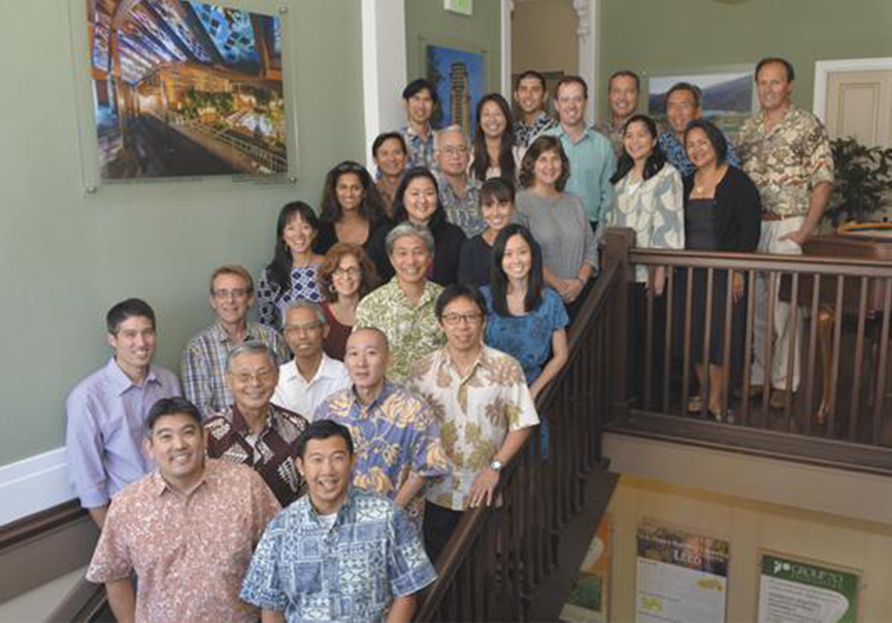Charles Kaneshiro, the head of Group 70 International, one of the largest architecture firms in Hawaii, says that sustainability goes back to the concept that resources are not unlimited.
“There’s not unlimited water or land,” the president and COO of the Honolulu-based firm told PBN. “And if these resources are going to be there for future generations, we have to think of preserving them.”
Sustainability is not just a word to Group 70, it’s at the heart of the way it conducts business, as it designs some of the state’s most prominent projects, including resorts, office buildings, mixed-use complexes, multi-family housing, educational facilities and planned communities.
“Our interest has been for a long time, what is good for Hawaii,?” he asked. “What is good for future generations? Is there a way we can achieve all of the owners’ goals and yet provide excellent design and cut energy use? Can we still do everything, but with less energy and water?”
For Group 70, it has been able to “walk the walk” in many instances by being a part of many firsts in terms of sustainable projects.
This list includes the first LEED Platinum school (Halau Hoolako at Kanu o Ka Aina learning Ohana), the first net zero community (Department of Hawaiian Home Lands’ Kaupuni Village), the first LEED Platinum laboratory (University of Hawaii’s C-MORE Hale), the first LEED Platinum commercial interiors (Group 70 second floor offices), the first LEED-certified financial institution (Kauai Community Federal Credit Union), the first LEED-certified preschool in Honolulu (Central Union Preschool) and the first LEED-certified public school (Puu Kukui Elementary on Maui).
To do these kinds of projects, Group 70 has gathered 32 LEED-accredited professionals, one of the largest bodies of LEED professionals within one company in Hawaii, to show its strong commitment to sustainability.
“Generally, we attract people who are like-minded,” Kaneshiro said. “In our company’s culture, if you don’t believe in those things, you will have a hard time staying here. We as a firm hold those values together. Our next goal is raising the bar on doing green buildings. Today, most design firms in Hawaii can do LEED Silver buildings, but how do we got to net zero? That’s the next challenge we’re working on.”
For its efforts in this area, as well as many sustainable firsts, Group 70 has been awarded PBN’s 2014 Leaders in Sustainability honor.
“Beyond preserving resources for the future, it’s really about doing the right thing,” Kaneshiro said, referring to the firm’s commitment. “For the earth, for Hawaii and for future occupants, it’s all centered on doing what’s right for the people who will live in or use the building or will be educated there.”
Besides its commitment to doing LEED projects and helping its professionals attain these credentials, Group 70 also participates in and attends sustainable design conventions and speaking engagements locally and abroad. It also contributes annually to local nonprofits with a sustainability focus through the Group 70 Foundation and through other avenues such as Habitat for Humanity.
Kaneshiro notices more and more of Group 70’s clients are starting out interested in sustainability, it isn’t something they need to be sold on.
“Most owners, government in particular, are asking us, ‘what more can we do,?'” he said. “Everything has changed now. Everyone is on board in thinking of our future. Before, no one was thinking of sea-level rise, but today, everybody is concerned with that.”
Iolani School is a Group 70 client that has pursued sustainability measures in new facilities, notably in its Sullivan Center for Innovation and Leadership. Opening in 2013, the 40,000-square-foot, four-story building—much of it devoted to science education—is packed with energy-saving design and technology. It earned LEED gold certification, featuring roughly 40 percent energy and water savings over what a comparably sized building might otherwise consume. Almost a fourth of all building materials were made from recycled products and more than 80 percent of construction waste was donated, recycled or reused rather than hauled off to a landfill. A rooftop garden gives students a hands-on lesson in collaboratively caring for the Earth.
“Group 70 has harmonized a sense of place with the unique ‘One Team’ culture of Iolani School while also maximizing the environment of our island home in sustainable and energy efficient ways,” said Timothy Cottrell, head of school for Iolani School, in his nomination letter.
Q&A
How has your business succeeded at achieving sustainability? Group 70 has designed a multitude of sustainable buildings and communities throughout Hawaii and the Pacific Rim. These projects include many groundbreaking projects such as: First LEED Platinum School – Halau Hoolako Kanu o Ka Aina Learning Ohana, Waimea; First Net Zero Community – DHHL Kaupuni Village; First LEED Platinum Laboratory – C-MORE Hale at UH Manoa; First LEED Platinum Commercial Interiors – Group 70 2nd floor offices; First LEED Certified Public School Campus – DOE Puu Kukui Elementary, Wailuku; First LEED Certified Financial Institution – Kauai Community Federal Credit Union.
What have you learned about sustainability that can apply to any Hawaii business? It starts with leadership. Sustainability cannot be implemented by simply issuing a policy or memo. It has to be demonstrated and modeled from the top. We’ve tried to do this at Group 70 by having leadership take the lead in obtaining their LEED accreditation, by allocating funds to the Group 70 Foundation that supports sustainable nonprofits, and by renovating our own offices to the highest standard of LEED certification.
